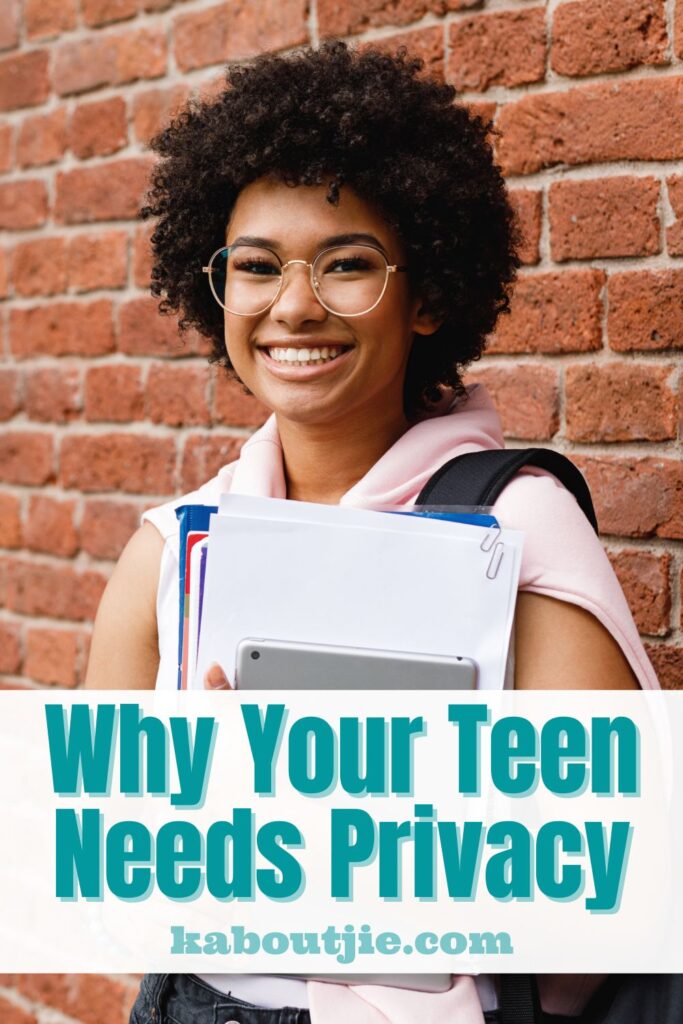As parents we feel a certain pride when our teens stake out their rights to more and more autonomy. After all, it’s a natural and necessary evolution from childhood to adulthood, a signifier that our ‘child is alright’ and that we are doing a ‘good enough’ job at parenting. However, as our teens carve out more independence for themselves in a world complicated by a vast digital realm that holds both known and unknown dangers, many parents are feeling compelled to put safety first in ways that can compromise their child’s privacy.

Why Is Privacy So Important To Teens?
Adolescence, the transition from childhood to adulthood, is marked by developing independence and identity.
Lekha Daya, a Counselling Psychologist and Senior Psychologist for the Panda app, a provider of free and low-cost mental healthcare in South Africa, says, “Teens are looking to the future and exploring the possibilities of the adult they will become. Some space from parents and their family, as they take charge of their own narrative for the first time and look outwards to fitting into society at large, is to be expected. The freedom to explore and experiment with different facets of identity goes hand-in-hand with a need for greater privacy as they navigate their unique sense of independence of thought and behaviour.”
Many parents innately recognise and understand this important psycho-social development stage and they have no difficulties in respecting their teens’ need for privacy and clearer boundaries. However, the challenge of keeping teens safe online is presenting a conundrum for many parents, especially those who are actively cultivating trust-based relationships with their increasingly independent children.
Mother and tech innovator, Rachelle Best, the founder of AI-based app FYI play it safe, says, “As a parent of a 15 year old daughter, it was unacceptable for me to be scrolling through her online chats. This type of device checking is too invasive, and it erodes trust and happiness in the parent-child relationship. That was my inspiration for the development of a non-invasive monitoring tool that balances the need to protect my daughter while still respecting her right to privacy.”
Trusting Your Teen Makes An Impact On Their Development
Affording your child privacy is an act of both love and trust which promotes their healthy development. Daya says, “Trusting your teen means you trust them to make good decisions, behave appropriately, and decide what information they need or want to share with you and others. Trust goes both ways. Your child needs to trust that you respect their right to have privacy and a say in decisions about their life.
When you and your child have mutual trust, you’ll have better communication. Your child will also be more likely to come to you when they need help. Teens’ development can be positively influenced by a trusting relationship with parents and caregivers as it encourages a growth mindset and builds confidence in their own abilities and sense of responsibility.”
A question that parents might ask themselves is: How much privacy is appropriate? Daya suggests a ‘need to know’ yardstick. She explains, “There are some things you need to know, such as where your child is going to be on Saturday night, how they’re getting there and back, and whether there’ll be alcohol or adult supervision. But there are other things that can be private between your child and their friends – for example, what they talked about at a party, or who they danced with.”

Practical Ways To Respect Your Child’s Privacy Include:
- knocking before going into their room
- giving them space to talk with their friends
- asking before looking in or getting things out of their school bag
Daya says, “It can also help to discuss privacy with your child, set some ground rules and work out some boundaries. These can be changed as your child gets older. You might also want to talk about situations where you’d need to cross the agreed boundaries. For example, this could be when you’re really worried that something isn’t right with your child.”
Child’s Privacy No-no’s Include:
- listening to their telephone conversations
- looking at things in their room or in their drawers
- reading their diary or checking their email account
- ‘friending’ them or communicating with them on social media if they don’t want you to
- calling them to check on them all the time
Balancing Privacy And Online Safety
Best recommends a high-quality level of communication with your teen around online safety is the best starting point in protecting them. The conversation about online safety needs to be ongoing, as the digital landscape is ever-changing. Parents have to keep up and be well-educated about risks, trends, digital spaces available to their child and content that they could access.
A lack of this knowledge will inevitably lead to anxiety and fears of the unknown and acting in unhelpful ways that your teen may resist, which will in turn erode goodwill in your relationship. The FYI play it safe app continuously stays updated with the ongoing changes and risks, so parents don’t have to know everything all the time.
To Keep Your Children Safer Online, FYI Play It Safe Recommends:
- Understanding age restrictions on the applications your child uses to give an indication of the type of content that they may encounter.
- Going through the Ts and Cs of the apps – the apps may seem innocent at first, but you also have to ensure you agree with what the apps are allowed to do with your child’s data and pictures.
- Activating full privacy settings – this include deactivating location settings, making sure that accounts are always set to “private” instead of public accounts and that strangers are not able to sent them direct messages.
- Setting up agreed screen time parameters for the family – this could be part of a digital contract between parents and their teens.
- Making use of parental controls and content filtering. This is a good way to filter content to ensure they don’t encounter anything that is not appropriate for their age.
- Modelling good digital habits
- Talking about online safety continuously

Add A Layer Of Protection Through Non-invasive Device Monitoring
Drawing on AI and ML, the global parental app, FYI play it safe monitors all the content of children’s online activity, including in-game chats, in a non-intrusive way. The app provides pro-active alerts of potential signs of online predator contact, cyberbullying, engaging with content around various mental health issues and accessing adult content without parents needing to do any phone and computer checks.
“’Protect them, but respect them’ is the driving value of FYI play it safe,” says Best. “The app is not a substitute for parental control tools but works with widely-used free software such as Google Family Link. What it does is eliminate the need for parents to conduct invasive checks on devices, chats and social media accounts, which can lead to conflicts and resentments. With their privacy protected, FYI play it safe helps to open up the conversations that parents need to have with their teens about staying safe online.”

About FYI play it safe
FYI play it safe is a South African based company offering a downloadable app to help parents globally, to protect their children from online harm and potential physical danger. The app is not a parental control app, but rather a complimentary layer of added security where parents are kept informed of potentially harmful situations. For more information visit www.fyiplayitsafe.com FYI play it safe is active on Facebook and Instagram at @FYIplayitsafe and shares regular articles and industry updates.

 Kaboutjie SA Mommy Blogs by Lynne Huysamen
Kaboutjie SA Mommy Blogs by Lynne Huysamen





Yes children do need us to trust them and give them all the privacy they need
I think having a chat with their friends and their parents so you get to know what kind of people your child hang out with it will help in trusting them but if the kind of friends she keeps are of a wilder side it definitely makes it difficult for parents to not invade their children’s privacy every chance they get
So with the apps like FYI that forewarns us of danger I think it will help us as parents.its never easy being a parent kKkkkkkkk
I totally agree with you there Sandra, it is so important to get to know your child’s friends. Thankfully my kids are at the age where it is easy to do that, I think as they get older it will get harder since teenagers probably don’t want to hang around with their friend’s mom LOL. I will see how that works out in time though.
This article is so true we need to give our kids space to explore who they are as they become an adult. And we need to have a relationship without kids built on trust so that they can come to us when they need to. Being too invasive will ruin the chances of our kids being open with us and FYI Play it Safe helps us to not be invasive. FYI sounds amazing and I like that I can be alerted if something does not seem right. I like all the alerts that we can receive depending on how we set up the app. Lynne, is the app free of charge or is there a mo thly subscription? Is it as easy as 1,2,3 to set up? If a message gets deleted will I be aware and will I be able to see what was deleted?
This is such a fantastic topic, because as parents we need to find the balance – we don’t want to invade our kids privacy but we do want to know what’s going on!
If your child sends or receives a message that is deleted you will still receive a screenshot and notification, which is fantastic.
FYI play it safe is a paid app – the monthly fee is $7.99 (appr R120) for the whole family or $79.99 annually (appr R1200) or $5.99 (appr R90) for a single child or $59.99 (appr R900) annually).